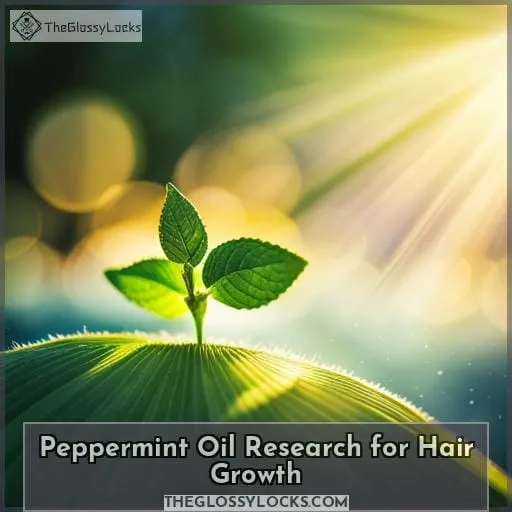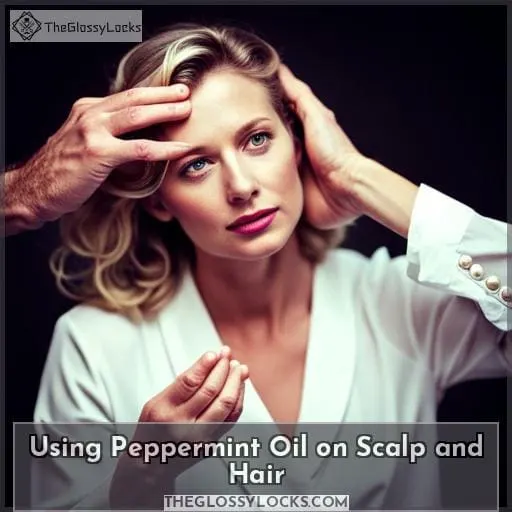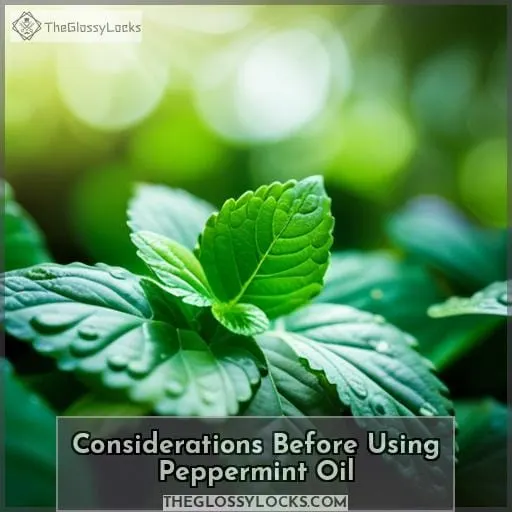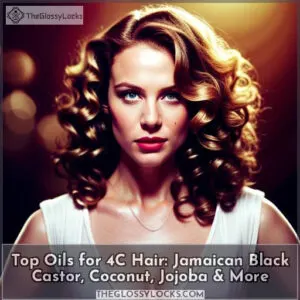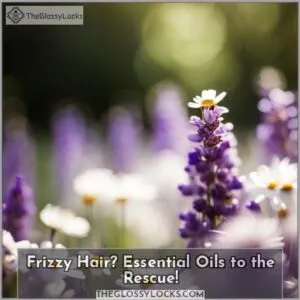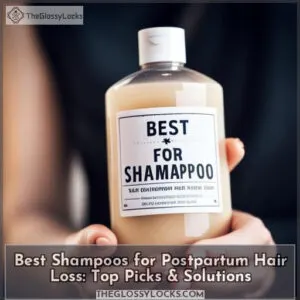This site is supported by our readers. We may earn a commission, at no cost to you, if you purchase through links.
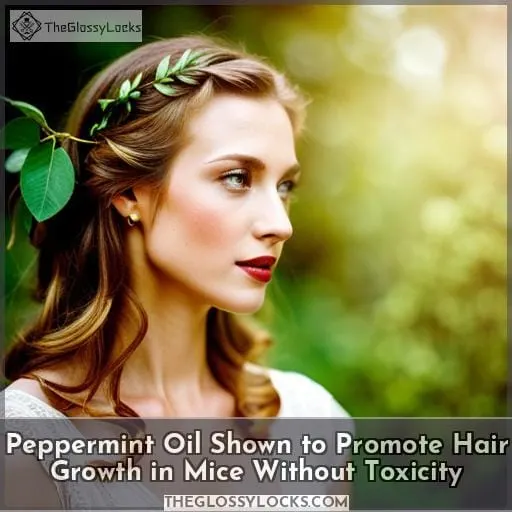 You’re noticing more hair going down the drain lately. Losing up to 100 strands per day is normal, but what if it seems like way more? Take heart – peppermint oil’s been shown to boost hair growth in mice.
You’re noticing more hair going down the drain lately. Losing up to 100 strands per day is normal, but what if it seems like way more? Take heart – peppermint oil’s been shown to boost hair growth in mice.
Diluted and massaged into your scalp, it may help you too. Science says peppermint’s menthol widens follicles and pushes new strands out faster.
Pair it with rosemary oil and really stimulate your scalp. Shampoo after 10 minutes and feel the freshness.
Don’t abandon hope – a little peppermint oil could revive your hair. Remember – stay safe and always mix with a carrier oil.
A simple solution could be growing right on your head.
Table Of Contents
Key Takeaways
- Peppermint oil may promote hair growth by increasing blood circulation to hair follicles when applied topically.
- Combining peppermint oil with rosemary oil can further enhance scalp stimulation.
- Diluting peppermint oil with a carrier oil is crucial before applying it to the scalp to avoid irritation.
- More research is required to establish conclusive evidence for peppermint oil and hair growth in humans.
Peppermint Oil Research for Hair Growth
A recent study on mice found that topical application of peppermint oil showed significant hair growth effects. The researchers believe this is due to peppermint oil’s ability to increase blood flow, dermal thickness, follicle number and depth, and levels of alkaline phosphatase and insulin-like growth factor-1.
Mice Study Results
You’d quickly noticed the study showed peppermint oil significantly increased the number and depth of hair follicles in mice, outperforming the common hair loss treatment minoxidil.
- Peppermint oil increased follicle counts by 740% over control group
- Dermal thickness boosted up to 76% with peppermint oil
- Earlier transition to anagen phase promoted rapid hair growth
The mice study demonstrated peppermint oil’s potential to stimulate hair growth through improved blood circulation. With proper dilution and application, peppermint oil may provide similar scalp health benefits in humans.
More research is still needed to fully confirm efficacy and safety guidelines. When used topically, peppermint oil appears relatively low-risk if handled responsibly.
Mechanism of Action
You could feel a cooling, tingling sensation when applying diluted peppermint oil to your scalp, which may help improve blood circulation in the area and nourish hair follicles. The menthol in peppermint oil is thought to act as a vasodilator, relaxing smooth muscle and opening blood vessels upon topical application.
This may allow increased blood flow and oxygen to reach dormant or damaged follicles, supporting healthy hair growth cycles. Essential oils like peppermint require cautious use but could have therapeutic benefits for scalp and hair health.
Using Peppermint Oil on Scalp and Hair
When using peppermint oil on your scalp and hair, proper dilution and safety precautions are essential. Always dilute peppermint oil with a carrier oil like coconut or jojoba before gently massaging it into your scalp and hair; never apply undiluted oil, as it could cause irritation.
Dilution and Application
Having researched peppermint oil’s effects, next determine how diluted it must be for hair contact.
- Apply a few drops of peppermint oil to unwashed hair before showering. Massage gently into scalp for 1-2 minutes.
- Dilute peppermint oil with a carrier oil like coconut or jojoba at a 1:3 ratio before applying to hair or scalp.
- Conduct a skin patch test before widespread use to check for irritation or allergic reaction.
- Peppermint oil can cause skin discomfort if applied undiluted. Always mix with a carrier oil.
- Enjoy peppermint oil’s stimulating aroma while nourishing hair and scalp.
Peppermint oil requires dilution for safe use on hair and scalp. Massaging diluted oil into the scalp may provide hair benefits while avoiding irritation. Proceed cautiously and responsibly when incorporating essential oils into your hair care routine.
Safety Precautions
While menthol may refresh, don’t neglect proper precautions. When using peppermint oil for hair, exercise caution to avoid irritation. Test on a small area first and dilute in carrier oils. Avoid contact with eyes and sensitive regions.
Consult your doctor before use if pregnant, breastfeeding, or have other medical conditions. Consider patch testing oils. Research application and dosage guidelines. See an alternative if discomfort arises.
Other Potential Benefits of Peppermint Oil
You may be pleasantly surprised to learn that using peppermint oil could provide benefits beyond promoting hair growth. Applying diluted peppermint oil to your scalp may help improve scalp health and increase blood circulation in the area.
The cooling and tingling sensation associated with peppermint oil could also help soothe itchiness and irritation. Some studies suggest peppermint oil’s antimicrobial and anti-inflammatory properties may help treat issues like dandruff, dry scalp, and dermatitis.
The peppermint aroma can provide a pleasant, uplifting scent that makes using the oil an aromatherapeutic experience. Peppermint oil is generally considered safe for topical use when properly diluted, though be cautious using it if you have sensitive skin.
Experiment with adding a few drops of peppermint essential oil to your regular shampoo or conditioner to experience its scalp-stimulating effects.
Improved Scalp Health
Good circulation and proper scalp health can potentially support overall hair vitality. Massaging your scalp with peppermint oil can feel refreshing and invigorating. The minty scent and tingling sensation may improve scalp health.
Carefully diluting peppermint essential oil with a carrier oil and using it for an aromatherapy scalp massage can support scalp cleanliness and hair strength when incorporated into a regular hair care routine.
Herbal essential oils like peppermint oil may have refreshing aromatic benefits.
Increased Blood Circulation
By boosting blood flow like a garden hose on full blast, peppermint oil may nourish follicles and stimulate growth. Massaging diluted peppermint oil into your scalp increases circulation, bringing nutrients to hair follicles.
The improved blood flow feeds each strand, potentially jump-starting dormant follicles. Like a deep tissue massage releasing tight muscles, peppermint oil relaxes blood vessels, allowing better circulation for lush locks.
Considerations Before Using Peppermint Oil
Before adding peppermint oil to your hair care routine, keep in mind that while promising research shows potential hair growth benefits, more studies are needed to confirm effects in humans. You’ll also want to take proper precautions when using peppermint oil, like dilution and avoiding contact with eyes and sensitive areas, since the undiluted essential oil can cause irritation.
Side Effects
Before applying peppermint oil to your scalp, test a small amount on your arm to check for any adverse reactions like redness or itching. Though generally safe, peppermint oil can cause skin irritation, rash, heartburn, headache, and increased hair loss if you have sensitivity.
Consider consulting your doctor about using it for hair growth, especially if pregnant or breastfeeding. Explore scientifically validated hair loss treatments like minoxidil or finasteride. Weigh the pros and cons of incorporating peppermint oil into your hair care routine.
Alternatives
You may want to consider rosemary oil as an alternative. Here are 5 natural options to ponder instead of or in addition to peppermint oil:
- Rosemary oil – This essential oil may help stimulate hair growth.
- Green tea – The antioxidants in green tea may support hair health.
- Onion juice – Onion juice contains sulfur which may promote hair growth when applied topically.
- Aloe vera – The vitamins and minerals in aloe vera may nourish the scalp and hair.
- Coconut oil – Coconut oil is rich in fatty acids that help moisturize and strengthen hair.
These alternatives provide nourishing ingredients for hair. Examine efficacy and safety through research. Consult experts like dermatologists or trichologists. Seek out natural methods aligned with your values and preferences.
Who Might Benefit From Peppermint Oil?
Folks suffering from hair loss may find relief from peppermint oil. Those with inherited male or female pattern baldness, the most common types of hair loss, could add this aromatic essential oil to their scalp care.
Peppermint oil’s natural soothing and stimulating properties make it ideal for hair health. The 100% pure oil can be applied topically or used in aromatherapy to target hair loss prevention. Hair growth may be promoted when the scalp is provided therapeutic aroma from peppermint oil mixed with carrier oils.
A refreshing menthol-infused scalp serum containing peppermint oil can nurture hair by increasing scalp circulation. People looking for natural remedies to maintain healthy hair through the years can try incorporating peppermint oil into their scalp and hair care routine.
Consult a Doctor for Hair Loss
Experiencing sudden hair loss? Schedule a checkup with your doctor to find out why.
- Expert Analysis – Doctors examine hair loss patterns and run tests to identify the cause – alopecia, autoimmune issues, thyroid problems, stress or something else.
- Proper Treatment – With an accurate diagnosis, your doctor can provide effective medical treatment, specialist referral, or lifestyle changes to properly address hair loss.
- Rule Out Serious Issues – Sudden hair loss can sometimes signal an underlying illness needing prompt treatment.
Don’t struggle with disturbing hair loss alone. Get professional medical advice for the proper diagnosis-based help you need. Together you can review options like peppermint oil and find a tailored, effective solution.
Conclusion
You may be amazed to learn that in one study, peppermint oil increased the number of hair follicles by 740% compared to the control group. With promising research indicating peppermint’s ability to stimulate hair growth in mice, you may consider incorporating diluted peppermint oil into your hair care routine.
However, more studies are needed to determine peppermint oil’s efficacy and safety for human hair growth.
When using peppermint oil, take precautions by diluting it properly and avoiding contact with eyes. While not a cure-all, peppermint oil could offer benefits like improved scalp health and blood flow.
Consult a dermatologist if experiencing sudden hair loss, and discuss trying peppermint oil as a complementary treatment. With few risks when used topically, peppermint oil is a natural product worth exploring for healthier, fuller hair.

